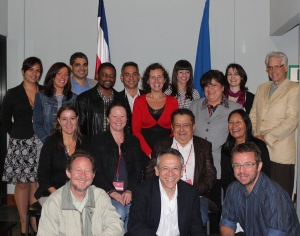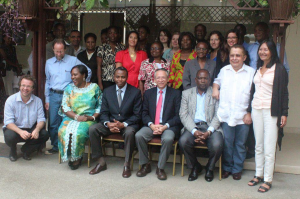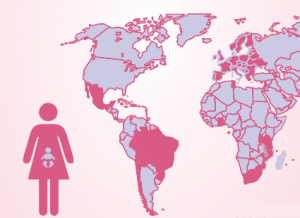Dr Mario Tristan, Costa Rica
 Dr Mario Tristan is one of the funders, the CEO and Director General of the International Health Central American Institute Foundation (IHCAI). He is also the Director of Cochrane central America & Spanish Caribbean branch of the Iberoamerican Cochrane Centre. He is actively participating in the MASCOT project (Multilateral Association for Studying Health Inequalities and Enhancing North-South and South-South Cooperation). This is an ongoing project, unveiled in 2012 and due to finish March 2014, and is coordinated by COHRED. MASCOT gathers partners and experts from Africa, Latin America and Europe, to identify and implement strategies for tackling health inequalities preferentially affecting children, adolescents and mothers.
Dr Mario Tristan is one of the funders, the CEO and Director General of the International Health Central American Institute Foundation (IHCAI). He is also the Director of Cochrane central America & Spanish Caribbean branch of the Iberoamerican Cochrane Centre. He is actively participating in the MASCOT project (Multilateral Association for Studying Health Inequalities and Enhancing North-South and South-South Cooperation). This is an ongoing project, unveiled in 2012 and due to finish March 2014, and is coordinated by COHRED. MASCOT gathers partners and experts from Africa, Latin America and Europe, to identify and implement strategies for tackling health inequalities preferentially affecting children, adolescents and mothers.
There is one aspect of the MASCOT project that has been especially interesting to me. The world literature for inequalities’ measurement offers many tools, but there are very few ones that allow measuring the impact of the interventions aimed at reducing inequalities. We are trying to establish a method to identify which interventions have really improved the reduction of inequality. So this is one of the main objectives of the project, which will eventually represent an evaluation’s work. Unfortunately, so far, there are very few countries that consider measuring or evaluating the impact of their own interventions. In the public health field, we find many policies that have been designed with this aim, but there is a lack of knowledge. Neither governments nor international organizations have tried to establish a systematic evaluation of the impact of their interventions on the reduction of inequalities. This is why we decided to do it, and so far, we have found interesting fact. For example, we have discovered that some interventions, and more specifically the prenatal control, could be held accountable for the decrease of maternal mortality in some of the concerned countries. These are the kind of examples that we try to identify. We have an idea of what the conclusions might be, but we are still in the analytical process. Now we are preparing the Mexico meeting (September 2013), to identify good practices of successful interventions on the reduction of inequality in maternal and infant health.
Our targeted beneficiaries are mainly governments, but not exclusively. I was in Guatemala two weeks ago and I had a discussion with the ministry of health authorities and a few NGOs that are trying to strengthen a programme of reduction of inequalities in the Guatemalan indigenous population, which is very high in this country. The Guatemalan Indigenous People represent an unattended population, with very basic or even nonexistent services. So the model MASCOT has developed to identify inequalities seems very attractive and important not only to the government of Guatemala, but also to the Guatemalan NGOs, as they play an essential role in the health field. In Africa, our idea is to disseminate among representatives of the public health authorities what MASCOT can offer. Even though the project is still a work in progress, the countries that have already participated have naturally already benefited from it to some extent. Ghana, for instance, is an example of the reach of vaccine coverage, which was fast and excellent. So there is an expressed willingness from health decision makers in Ghana to reduce inequality.
In the 11 “South” countries we are working with, we have found much readiness to adapt MASCOT’s findings to their own realities. This is very satisfactory to us, because the ultimate objective of the project is that we would also succeed in establishing and strengthening South-South cooperation. When I presented the MASCOT project in a meeting in Latin America for the first time, a representative from an international organization said: “but what are we, Latin Americans, going to learn from Africa?” Now he has changed his mind and says: “well, indeed, there were very interesting inputs and obviously the African community can bring us much, and vice versa”. So we are not only providing with “technical” support, but we are also actors of mentality changes. It seems that we in the “South” we are always looking up to the “North”. We rarely turn our heads to the right or left side to consider what happens in the South, and this is a shame. We should stop having our mind fixed to the North like that. We are supporting this cultural transformation; at least we make people think in that sense. The Mexico Meeting (September 2013) will be a great opportunity for this kind of South – South fruitful exchanges. This is the key event for the MASCOT project for now, because results will be showed, experienced will be shared and decisions will be taken. We want to show how achievement can be adapted, assumed, controlled by the countries regarding inequalities and their measurement and how they can be reduced, above all in the maternal and infant health field, which is a very fragile one.
Even though we are indeed waiting for feedback from countries at the Mexico meeting, we already had some interesting findings. On one hand, I was amazed by the situation of the inequalities in some countries. On the other hand, I discovered the necessity to improve the quality of information for decision making, where there are important inequalities that the governments haven’t made the effort to address so they could follow a better decision making process, based on the evidence of what happens in their country. The results might be actually very different from one country to another. We had some very positive feedback so far, especially from Bolivia and Chile. If we can compare Bolivia to Chile, with indicators as specific as the prenatal care or adolescent pregnancy, there are many differences in terms of structure of the health system and access to information. For instance, in Bolivia, where maternal mortality is very high, when we try to explore it we face difficulties in accessing information. In Chile, there is rather much information and it is considered by the World Bank to be a high income country now. However, this doesn’t mean it hasn’t large inequalities. So Chile could, thanks to the data that MASCOT is generating, reflect about its situation and see what was missing, in this regard.
 Members of MASCOT consortium with the Minister of Health, Dr. Daisy Corrale
Members of MASCOT consortium with the Minister of Health, Dr. Daisy Corrale
IHCAI’s involvement
Within the MASCOT project, we are mainly in charge of enabling the development of adequate methods for identifying inequalities in maternal and infant health. Besides, I had the delicate responsibility of implementing the repositories that would be adequate and interactive enough for both the internal and the external users of the MASCOT database to be able to access the information. This means that we also have to exercise the quite complicated task of quality control of the data we have been collecting during the project. In this regard, we have developed different methodological directives and rules that we believe have been sufficient to establish the utility, efficiency and efficacy of the data collected by MASCOT, which are complex ones. We have already generated an interactive database that will allow the MASCOT users to see what has been achieved all along the project, above all the “mapping inequalities”. In that process, we have had to take important decisions on what our sources of information would be to measure these inequalities. There are many papers that show how social data include some gaps and mistakes, so we preferred to use data that came from studies done by institutions collaborating with governments and international institutions, such as the Institute of Child Education and Psychology Europe (IECP) and The Department of Health Care Services (DHCS), in the United States. This has been our complex work during the project, and we have been supporting the efforts by MASCOT to conduct systematic reviews that would account for the interventions done by the countries in order to reduce inequalities. There is a team in South Africa that is leading the review on LMIC publications on maternal health, and recently the Health Action Partnership International (HAPI) in the UK, started one looking into HIC community-based interventions in MCH; they have both been very successful in these tasks. This represents an extraordinary product that is also giving to the international community the appropriate tools to get a better vision of what has been realized in this field. So, achieving all the aspects involved in the analysis of the quality of data that MASCOT has collected has then been our main responsibility.
Challenges and successes
The challenge we are still facing is especially having more data and more refined ones. For the description of the inequalities in maternal and infant health, we have used as a database, the Multiple Indicator Cluster Survey (MICS) from UNICEF, and the standard Demographic and Health Surveys (DHS) from USAID. But the problem is that these surveys haven’t been conducted in every country, and this is a recommendation that MASCOT will do: to have standardization in the coverage of this survey to the maximum amount of countries possible, because the access to governmental databases is very limited in most of the countries, or is distributed through different sources, which makes deep analysis difficult. These surveys are indeed very useful to us because as they repeat themselves in a variety of contexts and have a cross-comparison potential, these allow us to compare and see if there are differences between the types of inequalities. So whenever this tool is not available, we are facing a challenge now. In the particular cases of Mexico and Tunisia, for instance, we have studies that are very old. But these were still the baselines that we used and now we are using other more complementary databases in order to try to extract data that can at least give us an idea of the situations. We can’t compare these properly, because they come from different sources, but at least this represents pictures of places taken in different times, with different methods. Therefore, the methodological aspect is an important challenge that we try to improve with the “inequalities mapping” exercise.
There have been other successes in the project so far as well. We have managed to establish good team work that is rooted in institutions, that is adequately related to the research field and the decision making processes and that is representative of all countries participating in MASCOT, including European countries. We could establish a group that also had a multiplier effect on the ideas and findings of MASCOT. I am speaking about findings that really make countries aware of the inequalities they might have generated, that they didn’t see before and for which they did not understand that they needed some basic tool for making decisions. So this is an effect that we consider to be important, but we also believe that we are generating the necessity for such specific and concrete findings about interventions related to inequality. Some of these interventions have been very expensive while the results were quite poor, eventually. We are putting these cases into light. When we read reports or statistics from a country, we tend to warn about the fact that there might be some uncertainties, that we must be more careful with the analysis. For example we are worried about the Millennium Development Goals and their achievements, but above all about their monitoring, because when one starts to navigate through the national data produced, big gaps of information can be found. The quality of the data offered by the countries to people studying this topic has been debated in the international community, and this discussion is another relevant influence that MASCOT has had during this fruitful year.
We, the MASCOT group, are very happy about the work being done by COHRED, though Francisco Becerra, who has been an excellent coordinator, collaborator and friend, and who has led the MASCOT project in an outstanding way. Obviously, our partner Euroquality, represented by Angéline Serre, was equally excellent. They have collaborated with all parties, trying to make things move in the right direction. Our collaborations with COHRED, Euroquality and all the countries have been generally very satisfying.
 FP7 Project MASCOT workshop in Dar es Salaam, Tanzania
FP7 Project MASCOT workshop in Dar es Salaam, Tanzania
About COHRED
There are many things to be said about COHRED. Obviously, it has had much impact on our field and COHRED has conducted a positive steering, and a movement of researchers from everywhere, that allow them to access databases in order to see the whole panorama of how research is organized in the world. Besides, the technical contributions of COHRED are unique, and have been very useful to anyone, as a permanent call for reflexion to the research field as well, as much on global, regional and sub regional levels. The two South American conferences on research, in Brazil and recently in Panama, have been very interesting showcases that have contributed to the transformation of research into a priority in the health decision making processes, in launching initiatives and in the use of research and reflexions on the importance of research in health – not only in laboratories, but also for the translation of knowledge into policy and practice. Throughout its history, COHRED has made decision makers think about “how can I implement evidence-based facts in my country?”. We have been very happy to be able to collaborate with COHRED and participate in its meetings and in its calls for systematization of research issues in low and middle income countries.
I think COHRED should still increase its presence in Latin America, because here we have many multilateral cooperation organizations such as the PAHO/WHO, etc., but these have rather political agendas, while COHRED’s advantage is that it can it can collaborate with all parties in the decision making process, focusing on who needs it. COHRED can then orientate other institutions, define which tools they need, and address real priorities. This is why there is a great need for COHRED to be even more present in Latin America, as it can be a very valuable support to our countries.

